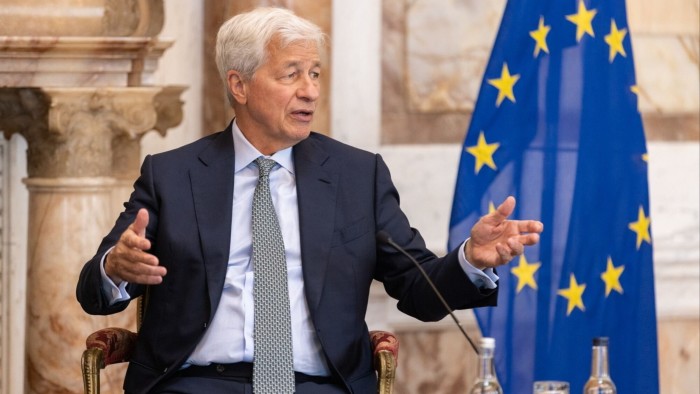Share this @internewscast.com
Unlock the Editor’s Digest for free
Brussels is set to suggest a tax on major corporations functioning within Europe, aiming to generate fresh sources of independent financing for the EU’s budget, which exceeds €1 trillion.
Known as the corporate resource for Europe, this initiative is detailed in a draft proposal by the European Commission, as reported by the Financial Times. It is scheduled to be revealed next week, although it requires unanimous agreement from all member states to become effective.
This yearly levy would target companies with a net turnover, after considering subsidies and taxes, surpassing €50 million, as defined by the EU.
All large companies operating in Europe would be covered by the levy regardless of where they are headquartered, according to the draft, and a “bracket system” would require higher contributions from the groups with the highest net revenues.
Other revenue raising measures to be unveiled next week include the EU taking a share of higher tobacco excise duties, a charge for non-recycled electronic waste and a handling fee for long-distance ecommerce packages — a levy that would mainly hit imports from China.
The commission regularly suggests new Europe-wide taxes when proposing the EU’s seven-year budget, but the measures — such as a financial transaction tax — have often failed to secure backing.
Brussels argues the unprecedented nature of the new demands for EU spending — from covering defence ambitions to rising debt interest — require a more radical approach.
But its ambitions for a bigger budget have long faced resistance from net contributors, notably Germany, the Netherlands, Austria, Finland, Sweden and Denmark.
The plans for a levy are likely to enrage corporate Europe at a time when companies are already struggling with sluggish economic growth and high energy costs.
JPMorgan Chase chief executive Jamie Dimon warned European business leaders on Thursday that their companies are “losing” against US and Chinese rivals.
The EU’s budget, traditionally around 1 per cent of the bloc’s gross national income, or roughly €1tn, is largely funded by national contributions but it also features independent sources of revenue, including customs duties and value added tax.
The commission wants to review and potentially increase these existing revenues, such as customs duties, the sale of permits under the bloc’s cap-and-trade carbon market, a levy on carbon-heavy imports and a fee on non-recycled plastic waste, which will increase from 80 cents a kg, according to the draft.
The amounts to be raised remain in brackets in the draft, suggesting that they still need to be agreed within the commission. The proposal is set to be formally announced on Wednesday alongside spending plans in the EU’s next seven-year budget.
The commission appears to have ruled out several other revenue raising options under consideration, including a controversial carbon tax on home heating and road transport, collecting entry fees from the EU’s new border system, and a tax on digital services opposed by the US.
The draft is not final and could still change, officials warned. A commission spokesperson refused to comment on the draft proposals.
The e-waste levy would apply an unspecified charge to the amount of non-collected electronic waste, such as discarded mobile phones and household appliances.
A “handling fee” for ecommerce packages flown into the bloc, to be set by the commission, could also provide an income flow for the budget.
But the proposal remains in brackets, suggesting it remains under active discussion. The tobacco levy would require countries to increase their minimum excise duties.
The commission already collects revenue from the EU’s emissions trading system, which charges industrial players for the amount of carbon dioxide they emit.
Brussels previously planned to take three quarters of the carbon border tax revenues, which will charge importers in six sectors for their emissions from 2026, for the EU’s budget. It expects to collect around €1.5bn from the measure in the first year of operation.








